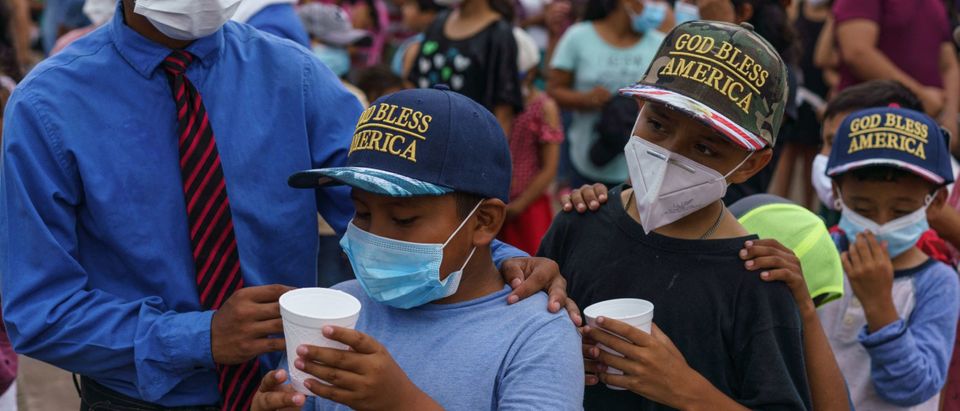Last week, the Biden administration consummated a shotgun wedding ordered by the federal judiciary when it officially “reinstated” the Migrant Protection Protocols (MPP, also known as Remain in Mexico) that it scrapped unilaterally earlier this year.
The Biden administration clearly has no enthusiasm for deterring abuse of our asylum system by requiring migrants with specious claims to wait on the other side of the border until an initial hearing can be held, rather than releasing them into the United States, where they join the burgeoning illegal alien population. The other partner at the altar – the government of Mexico – is equally unenthusiastic about the prospect of having large numbers of migrants waiting on their side of the border for a date before a U.S. magistrate.
The concerns of the Mexican government should be easily allayed, which is probably why it agreed to help the Biden administration pretend like it wants to deter mass illegal immigration and halt large-scale asylum fraud. Its reluctant partner in Washington has made it clear that they will comply with the judicial order as minimally as it can possibly get away with. At the same time, the Biden administration is working with all haste to dot all of its “i’s” and cross all of its “t’s” as it endeavors to comply with all federal administrative procedure requirements to get rid of the Migrant Protection Protocols in a way that will pass muster with the courts.
Despite splashy news headlines and hand wringing on the part of open borders advocates, MPP is in effect in exactly one location along the 1,954-mile border with Mexico: El Paso, Texas, which has a very effective border wall in place (another project scrapped by the Biden administration), making it one of the least active spots for illegal border crossings. According to the agreement, six more locations will be added to the list, but there is no firm timetable for doing so.
The Biden administration has also pledged to limit the number of people it returns to Mexico to just 30 per day, which at current rates of illegal border crossings, would take care of less than one-half of one percent of the flow. Much like Department of Homeland Security (DHS) Secretary Alejandro Mayorkas’ recent memoranda that placed nearly every illegal alien in the U.S. off-limits to removal, the MPP severely constrains the categories of migrants who might be required to wait in Mexico to a point where finding 30 eligible candidates a day may be a challenge.
The “categories of migrants exempted from the program will also be expanded to include elderly migrants, those with physical or mental disabilities and lesbian, gay, bisexual and transgender migrants, who could face discrimination in Mexico,” according to the Wall Street Journal. And that’s before Mayorkas has even had a chance to give his folks their instructions on how to carry out – or, perhaps more accurately, how not to carry out – MPP 2.0. In perhaps the understatement of the year, White House press secretary Jen Psaki responded to questions about the restart by saying, “We did not eagerly reimplement it.”
There can be little doubt that further instructions from Mayorkas are on their way. As a DHS spokesperson made clear, the secretary “has repeatedly stated that MPP has endemic flaws, imposed unjustifiable human costs, pulled resources and personnel away from other priority efforts, and failed to address the root causes of irregular migration.” Not exactly an encouraging sign that DHS will make much use of this tool to deter illegal immigration and asylum abuse.
The Mexicans, too, have added a few new conditions of their own. The Mexican government has said it will only accept Spanish-speaking migrants to wait in their country. That condition immediately excludes the growing number of global migrants who have been using Mexico as their gateway to the U.S. It even excludes several of the largest categories of Western Hemisphere migrants. Indigenous language speaking migrants from Central America constitute a significant portion of those arriving from the Northern Triangle countries. Additionally, Portuguese-speaking migrants from Brazil constitute a fast-growing segment of the people making their way north via Mexico.
Whatever minimal deterrent effect that the restoration of MPP might have on the record pace of illegal migration and asylum abuse will be short-lived if the administration gets its way. While DHS is half-heartedly complying with the court order to restart MPP, the Department of Justice is in court seeking to vacate the ruling. “Once the court injunction is lifted, MPP will be terminated,” DHS vowed on Dec. 2.
While the shotgun reimplementation of MPP is a victory of sorts for those who support border enforcement and an end to wholesale asylum abuse, it might be wise to hold the applause. Given the plans of the Biden administration, the newly reinstated MPP amounts to the sound of one hand clapping.
Ira Mehlman is media director at the Federation of American Immigration Reform (FAIR) in Washington D.C.


